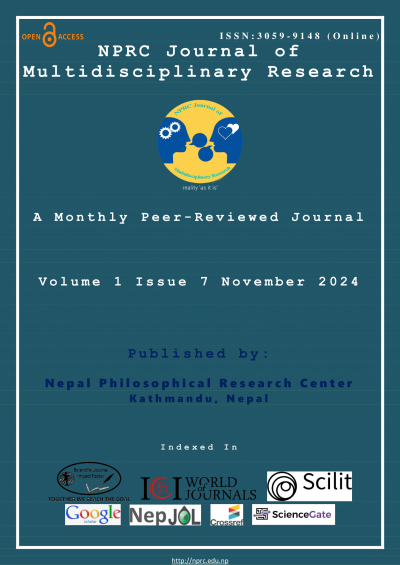Stress Management Practices Among Employees in Nepal: A Review of Literature
DOI:
https://doi.org/10.3126/nprcjmr.v1i7.72441Keywords:
Coping Strategies, Employee Well-being, Occupational Stress, Organizational Culture, Stress ManagementAbstract
Background & Objective: Fast economic development and organizational change in Nepal have brought increased occupational stress among employees of different sectors. Occupational stress negatively affects the mental and physical health of the employee, which results in decreased productivity and increased turnover. This review aimed to synthesize the existing literature on stress management practices among employees in Nepal.
Methodology: A systematic literature review was conducted using multiple academic databases. The search focused on peer-reviewed articles published between 2015 and 2024, employing specific inclusion and exclusion criteria to ensure relevance and quality. Data were extracted and analyzed thematically, categorizing findings based on organizational stressors, individual coping strategies, and cultural considerations in stress management.
Key Findings: The review identified a complex interplay of factors that contribute to workplace stress in Nepal, including workload, organizational culture, and socio-cultural expectations. Effective stress management strategies reported in the literature included exercise, mindfulness practices, and the establishment of supportive organizational cultures. However, these strategies are often not very effective due to organizational factors and a lack of comprehensive support systems.
Conclusion & Recommendation: The findings indicate that organizations in Nepal should urgently prioritize stress management as an integral part of ensuring employee well-being. It is about an inclusive approach that integrates organizational support with a positive work culture and appropriate resources. Further research is required to focus on specific interventions, such as mindfulness training and wellness programs, and explore the unique stressors within different sectors, including agriculture and tourism.
Downloads
Downloads
Published
How to Cite
Issue
Section
License
Copyright (c) 2024 The Author(s)

This work is licensed under a Creative Commons Attribution-NonCommercial 4.0 International License.
This license enables reusers to distribute, remix, adapt, and build upon the material in any medium or format for noncommercial purposes only, and only so long as attribution is given to the creator.





